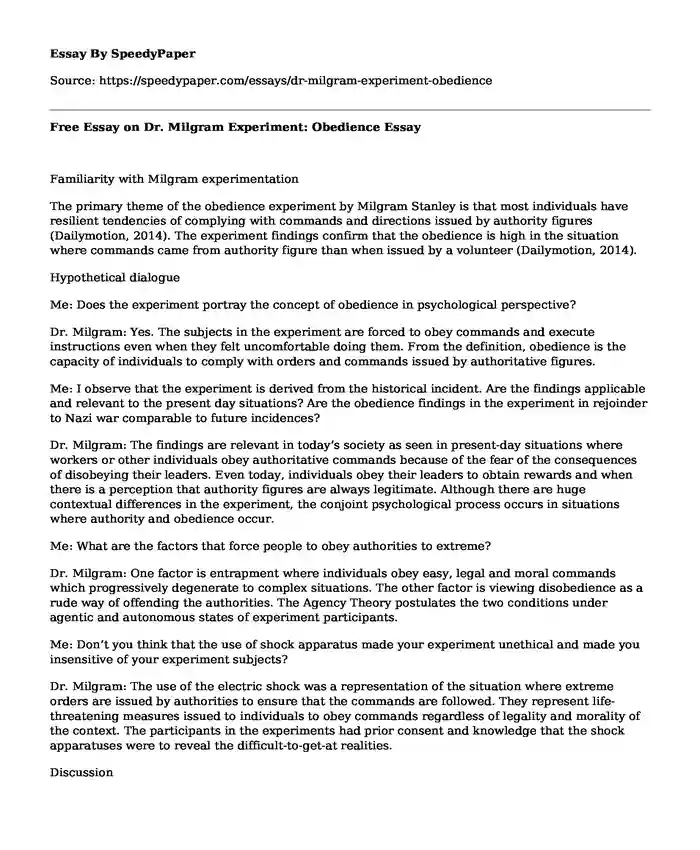
| Type of paper: | Essay |
| Categories: | Psychology Sociology Law |
| Pages: | 3 |
| Wordcount: | 728 words |
Familiarity with Milgram experimentation
The primary theme of the obedience experiment by Milgram Stanley is that most individuals have resilient tendencies of complying with commands and directions issued by authority figures (Dailymotion, 2014). The experiment findings confirm that the obedience is high in the situation where commands came from authority figure than when issued by a volunteer (Dailymotion, 2014).
Hypothetical dialogue
Me: Does the experiment portray the concept of obedience in psychological perspective?
Dr. Milgram: Yes. The subjects in the experiment are forced to obey commands and execute instructions even when they felt uncomfortable doing them. From the definition, obedience is the capacity of individuals to comply with orders and commands issued by authoritative figures.
Me: I observe that the experiment is derived from the historical incident. Are the findings applicable and relevant to the present day situations? Are the obedience findings in the experiment in rejoinder to Nazi war comparable to future incidences?
Dr. Milgram: The findings are relevant in today’s society as seen in present-day situations where workers or other individuals obey authoritative commands because of the fear of the consequences of disobeying their leaders. Even today, individuals obey their leaders to obtain rewards and when there is a perception that authority figures are always legitimate. Although there are huge contextual differences in the experiment, the conjoint psychological process occurs in situations where authority and obedience occur.
Me: What are the factors that force people to obey authorities to extreme?
Dr. Milgram: One factor is entrapment where individuals obey easy, legal and moral commands which progressively degenerate to complex situations. The other factor is viewing disobedience as a rude way of offending the authorities. The Agency Theory postulates the two conditions under agentic and autonomous states of experiment participants.
Me: Don’t you think that the use of shock apparatus made your experiment unethical and made you insensitive of your experiment subjects?
Dr. Milgram: The use of the electric shock was a representation of the situation where extreme orders are issued by authorities to ensure that the commands are followed. They represent life-threatening measures issued to individuals to obey commands regardless of legality and morality of the context. The participants in the experiments had prior consent and knowledge that the shock apparatuses were to reveal the difficult-to-get-at realities.
Discussion
The experiment was conducted to determine if individuals would execute authoritative commands even when they are legally and morally wrong. It can also be explained using the Attribution Theory that the experiment is an interpretation of individual’s actions as a consequence of authoritative commands that place them in difficult situations in choosing to obey or disobey the orders (Benjamin & Simpson, 2009). The hypothetical questions are based on a personal critique of the experiment regarding its relevance in the contemporary real world and ethical issues surrounding the experiment as a psychological research technique. The responses to the application of electric shocks by Dr. Milgram is derived from Social Impact Theory to explain the different echelons of obedience that can be derived from extreme authorities (Benjamin & Simpson, 2009). The responses to the question are based on personal propositions on how Dr. Milgram would have justified the critiques.
Ethical issues in the experiment
The use of electric shock is unethical and insensitive for Dr. Milgram as the emotional upset of the subjects is not considered. Feasibly Dr. Milgram should have tested the research hypothesis without inflicting emotional upset and distress to the subjects. The participation should have been based on a voluntary basis with the provision that participants could withdraw or quit anytime. If the same research was conducted today, the aspects that will change are the ethical considerations. Contemporary research ethical canons stipulate that research should be executed with participants’ consent to eliminate the concept of deception (Benjamin & Simpson, 2009).
Conclusion
Despite the critics, Dr. Milgram’s experiment is imperative in the sense that it impacted on the authority and obedience theories, and research design and ethics used in modern psychology.
References
Benjamin, L. & Simpson. (2009). The power of the situation: The impact of Milgram’s obedience studies on personality and social psychology. American Psychologist, 64(1): 12-19.
Dailymotion (Director). (2014). The Milgram Experiment [Motion Picture]. Retrieved from http://www.dailymotion.com/video/x24guhr_the-milgram-experiment_shortfilms
Cite this page
Free Essay on Dr. Milgram Experiment: Obedience. (2017, Sep 17). Retrieved from https://speedypaper.net/essays/dr-milgram-experiment-obedience
Request Removal
If you are the original author of this essay and no longer wish to have it published on the SpeedyPaper website, please click below to request its removal:
- Organizational Culture Theory in a Free Essay from Our Database
- Entertainment Was a Luxury - Personal Essay Sample
- Marketing Essay Example on Successful and Failed Products
- The Spread of Western Classical Architecture, Essay Example
- Plans Needed in Crisis Management, Essay Example
- The Imaginary Orient - Article Review Essay Example
- Essay Sample on Elements of Crimes As Proved By the Prosecution
Popular categories




